What Do We Know About Avery Jackson?
Critics and celebrants of gender-affirming care alike hold Avery up as a poster child. But for what?
The photograph will remain among National Geographic’s most provocative and impactful images, up there with the searing jade eyes of the Afghan girl Sharbat Gula, or the stretched, ring-clad necks of the Ndebele people.
On the cover of the January 2017 special issue, a pink-clad and pink-haired nine-year-old reclines, an expression of calm and confidence. The title of the issue: “Gender Revolution.” The caption below the photo: “The best thing about being a girl is, now I don’t have to pretend to be a boy.”
Though Avery Jackson’s media debut occurred a full decade after Jazz Jennings’, it signified the enormity of the shift that had taken place since. The Jennings family had appeared on 20/20 with Barbara Walters in 2007 to plead their case for why they should be allowed to raise their male child as a girl. Jazz was a rarity then, and a curiosity. Ten years later, there were enough trans kids to successfully wage a revolution, and Avery was the face of it, with his—or, well, her—mother Debi tirelessly advocating on Avery’s behalf.
Per Debi’s social media posts, some of which were leaked to me by a source in an affirming parents’ Facebook group, Avery socially transitioned at four. Her puberty was blocked, and she took cross-sex hormones at age eleven. It’s unclear, though, if the transition “worked.”
That is, if the point of transition was not just to alleviate gender dysphoria, but to improve mental health—as advocates for gender-affirming care often claim—then it didn’t seem to have done so for Avery. Debi reported that Avery “plunged into *severe* depression” three weeks after receiving puberty blockade.
Years later, she continued to suffer from depression and anxiety.
Debi and Avery continued their joint activism—Avery even palled around with President Biden. But eventually, she soured on it. In a scene from the 2020 HBO documentary Transhood, Debi outlines their joint activism activities for the day, including selling Avery’s book. Avery is not pleased.
“I just don’t want to even have a book. I’ve done too much in this world, it’s ruined my life and now everyone in this world is going to know and it’s just gonna make my life worse.”
Debi points out that, just a few years before, Avery wanted everyone to know.
“Yeah, I did, but that was a really stupid silly mistake and now I don’t.”
Then, in January, 2022, Debi shared that Avery had yet another coming out. Avery was now non-binary—and retiring, before even turning fifteen, from public life.
Debi assured us that Avery had no regrets, that they agreed that they had needed blockers so they wouldn’t grow up to “look like dad.” Estrogen, they said, had “let me live.” But, they added, “I’m just at a really good place now and want to embrace every aspect of gender when or if I feel it.”
Six months after the announcement of Avery’s change in gender-identity came an announcement of Avery’s change of name. They transitioned to privacy, and said that, if they ever did take up activism again, “I want [my advocacy work] to be on my terms, and I don't necessarily want it to be about trans people.”
Not long after, I started seeing posts theorizing that Avery had detransitioned, or regretted transitioning. Some of that may have been from misinterpreting that scene from Transhood, assuming Avery is avowing that transition made life worse—as opposed to complaining about becoming an extension of their mother's activism.
It is, of course, impossible to know exactly what Avery was thinking at any of these stages, since he himself has not spoken out. [I’m dispensing with identities now, and writing based on sex.] We don’t know what he meant by being “just at a really good place now” when he transitioned to non-binary. Had he stopped estrogen? Was that because he didn’t want the effects anymore? Was he still on hormones, but no longer cottoning to the idea of full girlhood? Had the interventions disappointed him, so that he now realized changing sex was not possible? Did he feel it had all been a mistake?
Was he feeling around for the exit ramp, and arrived at nonbinary on the way? Was he now nonbinary because, if he did feel regret, there was no way to go back after blockers, hormones, and surgeries? Or was the person standing between him and that exit ramp his mom—who had emotionally, financially, and temporally invested so much in Avery’s transition? Because while Avery’s trajectory had shifted, his mother’s hadn’t.
Debi Jackson is very much on the minds of Averywatchers, who assume that she is on some level a “Munchie mom.” That is: a mother suffering from Munchausen syndrome by proxy, a mental illness in which the caregiver causes, maintains, or exacerbates their care recipient’s illness to satisfy their own needs—for attention, for self-importance, for a reason to live.
Currently, the most famous example of this form of child abuse is Gypsy-Rose Blanchard. Her mother diagnosed her variously with leukemia, muscular dystrophy, and asthma—among many other illnesses—and she underwent several unnecessary surgeries. Eventually, Blanchard was convicted of murdering her mother. (Now she’s out of jail, and an influencer, with a child of her own.)
But many suspect quieter forms of Munchausen syndrome by proxy in the gender world, where parents like Debi undergo a transition themselves, becoming activists. They get fame in their own right. (Debi’s social media handle is @the_DebiJackson, implying that she is so famous that others might imitate her.) Debi maintains that she was a conservative Southern Baptist before Avery’s transition, and that her family was unsupportive. She gave up her identity, her community, for the child—which would not only put enormous pressure on the child to continue in transition, but would incentivize Debi to insist on Avery’s transsness at all costs. Otherwise, she’d lose her identity and her community all over again.
And Debi does insist on Avery’s transness. After Avery becomes non-binary, and retires from activism, Debi maintains that the affirmative model was the right way to go, and that the lesson is still “let your kid lead”—even though Avery had said, in that 2020 documentary, that the way he or she or they felt even at twelve was different than they’d felt earlier. In other words, Avery changed as he grew up, like all kids do. Like all people do. Still, Debi had, from the beginning, insisted that children should drive their own medical care
And Debi hasn’t really let Avery lead, because if she had, she would have heeded his call to stop using him as a publicity tool. “She would hear me talking to my husband and ask, 'Why are you having to go and tell so many people about trans kids, Mom?’” Debi said. But she didn’t stop. She rewrote history, erasing Avery’s continued struggles during medical transition, pretending, or convincing herself, that it had been a miracle cure.
We don’t know how Avery would be doing if she did stop, if she truly let him lead and followed him away from gender identity. We don’t know if he regrets, or if he’s made peace with what’s happened to him, or how he is coping. We will have to handle the uncertainty, the fog of ambiguity. If more parents like Debi did that, we’d certainly have fewer stories like Avery’s.
With thanks to the donor of these screenshots.



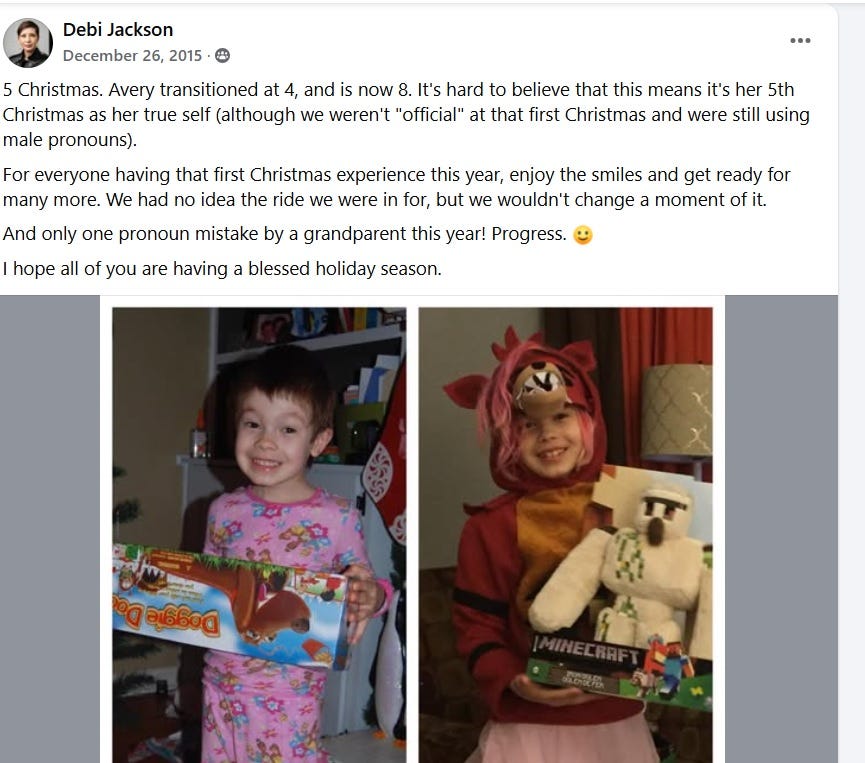
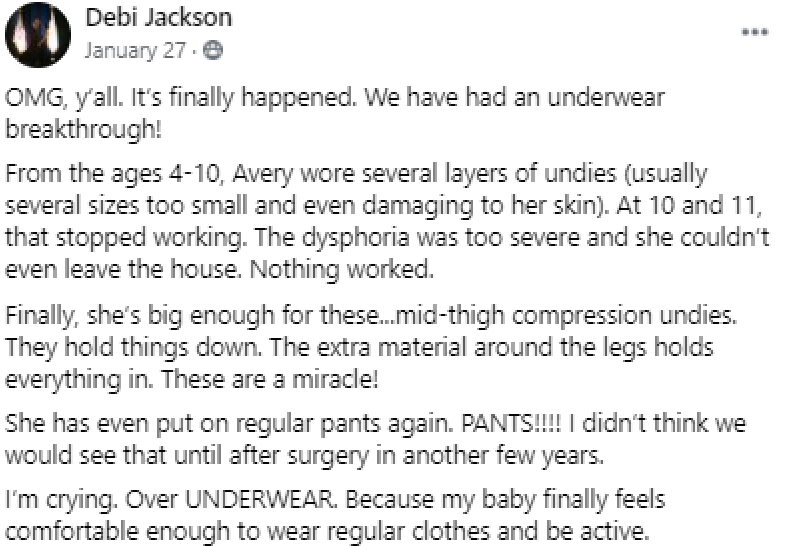



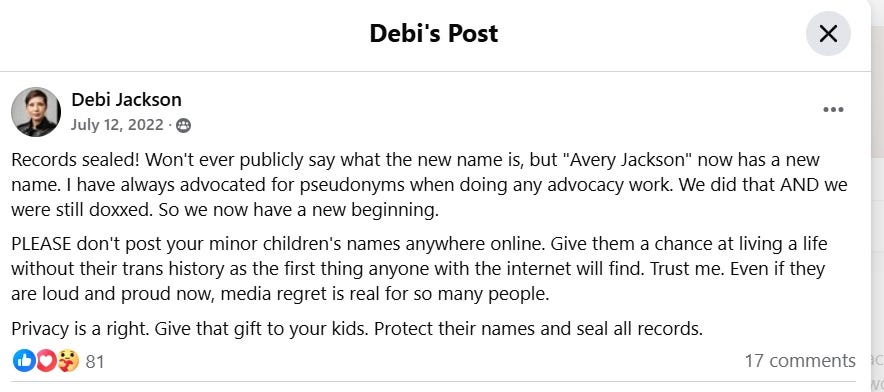
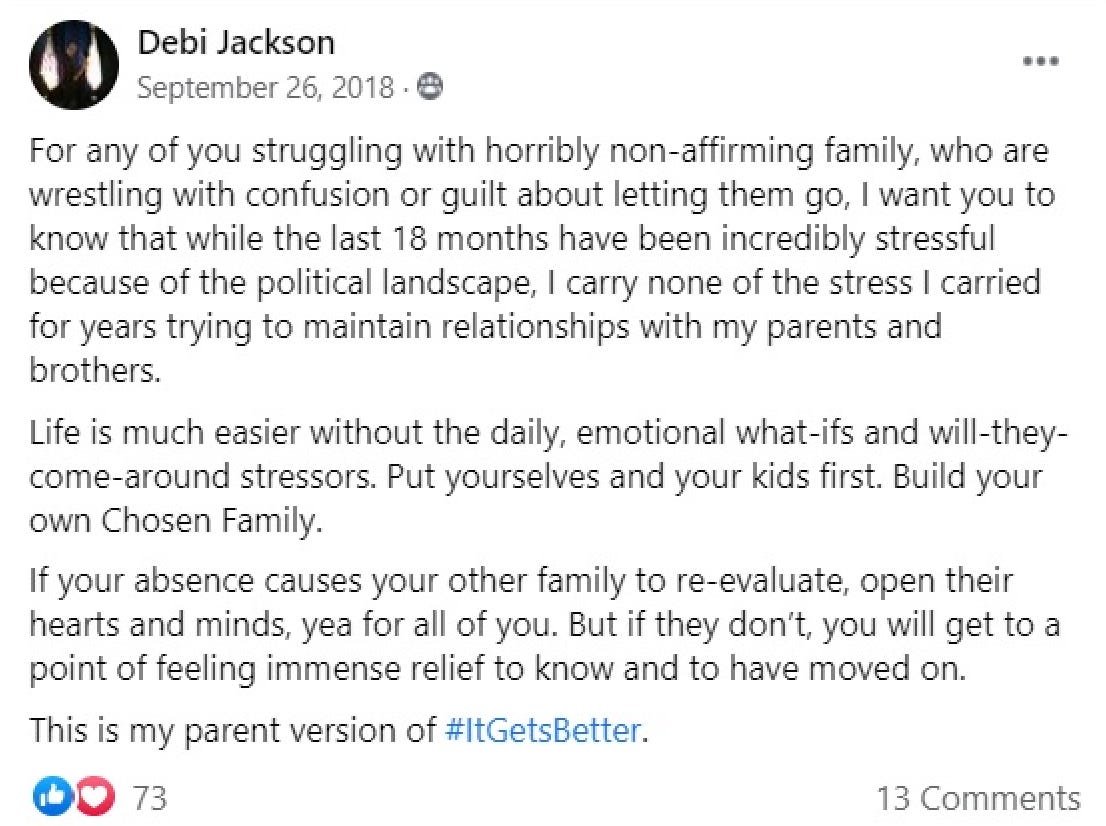
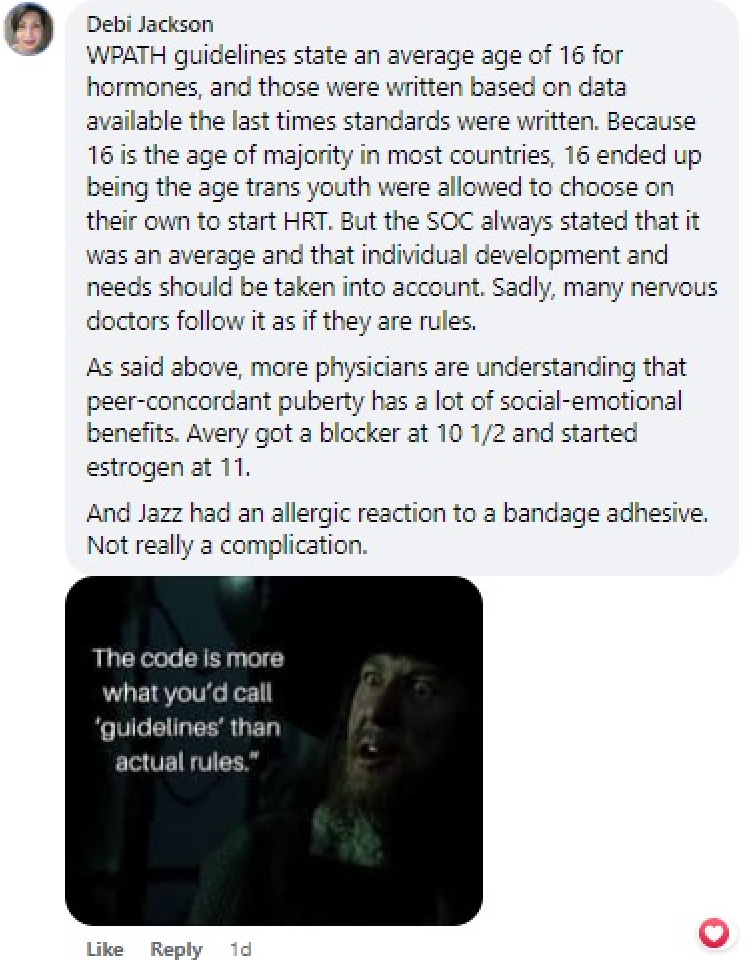
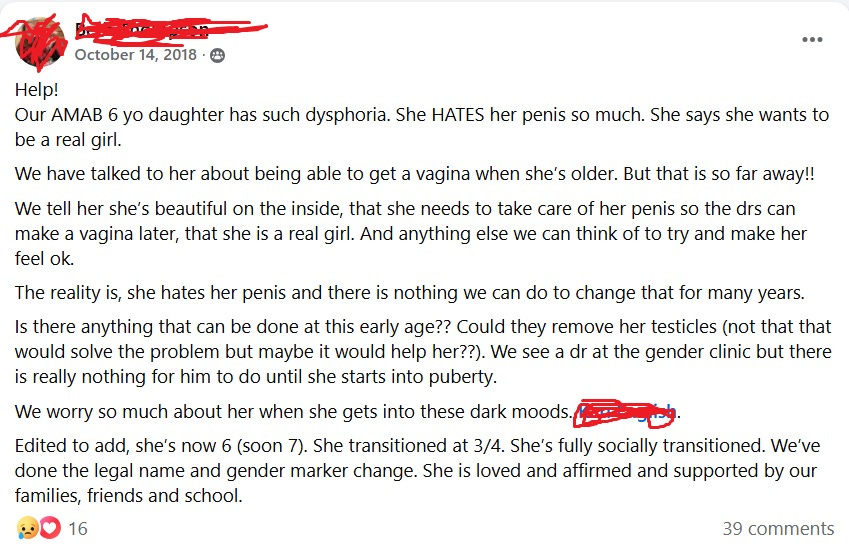
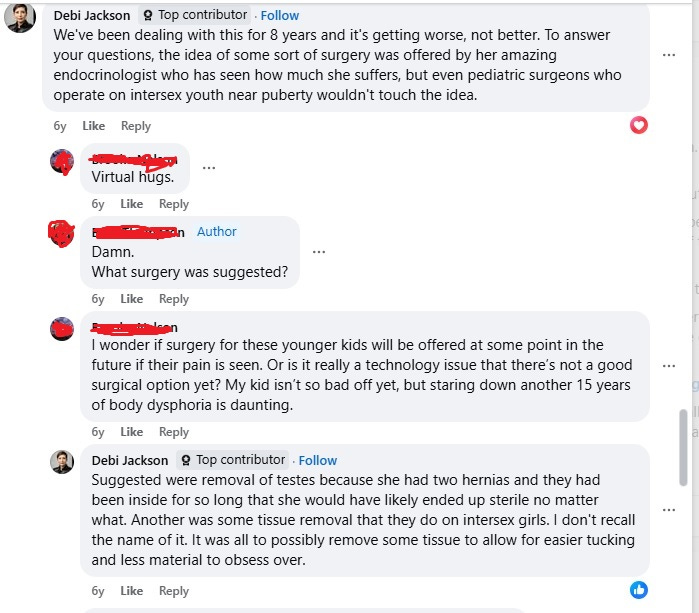

This is horrific. I was having dinner with three highly successful 50 something gay men this weekend. A doctor, hedge fund manager and a marketing director. All three said they fear they would have transitioned as children had this been available in the 80’s. They didn’t understand why they were different. They knew something was off before they knew they were gay. They didn’t want to be different and would have done anything to change that trajectory. Eventually, they grew up, accepted themselves, found love and fulfilling lives. None of that would have happened had they transitioned. Stop transing gay kids.
We need to stop calling GnRH agonists 'puberty blockers'. They stop sex hormone production. They are chemical castration drugs. Of course, Avery felt worse after his natural testosterone levels were dropped to zero. Giving estrogen to his male body does not replace testosterone.